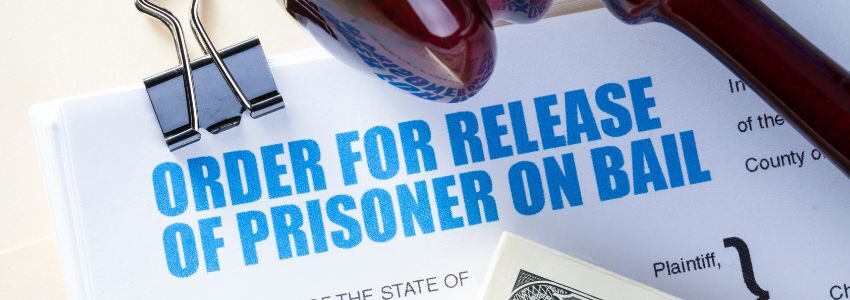What Does Unsecured Bail Bond Mean?

Published December 30, 2023
Facing the reality that you have just been arrested is beyond confusing and scary. And one of the first things that happens in a hearing is determining whether you’ll be released on a bond. There are two types of it: secured and unsecured. Knowing their differences can help you in navigating your situation.
And even if you’re not facing a jail situation, it helps to be aware of this kind of discourse. This article will focus mainly on what unsecured bail bonds mean. We’ll define it, discuss the difference between secured and unsecured bail, and who qualifies for it. We will also discuss its benefits, risks, and how you can apply for one. It’s going to be a comprehensive write-up. Let’s get started.
What Is an Unsecured Bail Bond?
Unsecured bail bonds, or Release on Recognizance (ROR) or signature bonds, are when the defendant is released on personal recognizance or citation. They do not have to reimburse money or submit collateral to the court. They also do not need a bail bondsman to secure their release.
Unlike other bonds, unsecured bonds are anchored on the defendant’s word to attend all court proceedings.
The judge must be satisfied that the suspected person will take their words seriously. It is for the court to permit an unsecured bail. They must show up for court proceedings.
A few factors are in play for a judge to grant an unsecured bail bond. For instance, the nature of the crime. Also, the defendant’s likelihood to show up for court dates without paying the bail amount.
What’s the Difference Between Secured and Unsecured Bail?
In secured bonds, the defendant must render collateral. It is either in the type of property, assets, or cash to the court or the bail bondsman. It is done to secure their release. The collateral guarantees the defendant will complete all court requirements during their trial. The court or the bail bondsman may take the collateral when they fail court.
There are a few differences between secured and unsecured bail bonds. Here are the key ones:
1. Collateral requirements
One of the main distinctions between a secured and an unsecured bond is the necessity that a defendant must fulfill a collateral. It is done to ensure their freedom through bail. For the bail bond process to be of success with a secured bail bond, the accused must provide collateral.
For an unsecured bond, no collateral is required. The defendant is released based on their word to show up for all court appearances.
2. Financial responsibility
In a secured bond, the defendant must reimburse a nonrefundable fee. It is usually a percentage of the bail amount to the bail agent. On an unsecured type, they are free of any financial obligations. It is as long as they show up in all court proceedings. They are also, given that they oblige to the court’s conditions of release.
3. Risk element
In a secured bond, the bail bondsman understands all the risks by having a financial agreement with the court. It is a matter of paying the total bay amount should the defendant forfeit court. An unsecured bail bond holds no risk factor for the accused. It will continue if they successfully adhere to all court requirements during the trial.
Who Qualifies for Unsecured Bail?
1. Nature of the crime
The severity of the crime is a huge consideration. The court analyzes it before granting an unsecured bond. Minor crimes and misdemeanors of alike nature. The two are eligible for unsecured bonds. Major crimes, conversely, like felony charges, usually do not fit the case.
2. The criminal history of the dependent
The defendant’s criminal history also matters in granting an unsecured bond. A defendant with no criminal history is more likely to be approved for bail. It is as compared to a defendant who has one.
3. Flight risk
Another consideration is the likelihood of an accused not appearing in court after a bail release. It determines whether they will be granted an unsecured bail bond.
4. Community ties
The defendant must prove its ties to the community. For one, having a family or a stable job. Suppose the judge has any reason to believe the defendant threatens the community. The bail on personal recognizance will not be approved.
How to Apply for an Unsecured Bond?
1. Bail hearing
The defendant is arranged in court. The judge must rule whether they are worthy of freedom on bail as they await trial.
2. Evaluation of risk factors
During the bail hearing, the judge analyzes all possible jeopardy of releasing the defendant on personal recognizance. The judge will decide on a grant based on the evaluation.
3. Conditions of release
There are a few conditions that a defendant is required to respect when released. These conditions include attending the court. Moreover, they comply with possible fines and restrictions.
4. Compliance and Monitoring
The defendant should comply with the said conditions. They may be subject to surveillance by pretrial services.
Benefits of Unsecured Bonds in the Bail Bond Process
1. No upfront payment
The most significant advantage of unsecured bonds is they do not demand an upfront payment. The defendant or their family do not need to come up with cash or property as a guarantee. It makes it more accessible for many people who may not have tremendous assets.
2. Preservation of liquid cash
Due to the absence of an upfront fee, defendants and their families can preserve their liquid cash. It can be beneficial for those with limited financial resources.
3. Simplicity and efficiency
Unsecured bonds streamline the bail process. There’s no requirement for evaluation for appraisal of property to use as collateral. It speeds up the process of securing release.
4. Promise based
An unsecured bail bond relies on the defendant’s promise. It is the word to follow through with all court requirements. The contract holds them to specific conditions outlined in the bond.
5. Effective pretrial release method
A study mentioned by the Office of Justice Programs suggests that an unsecured bond can be an effective pretrial release method.

ADVERTISEMENT
Frequently Asked Questions About Unsecured Bail Bonds
1. What is an unsecured bond example?
Let’s say that Andrew is arrested, and his bail is set at $5,000. He doesn’t have to pay his bail upfront. He also does not have to have any valuable assets to serve as collateral. The judge decided to grant him an unsecured bail bond. It is because he lacks a criminal history. He also has a strong linkage to the community.
Andrew or a cosigner would sign a contract agreeing to reimburse the full bail amount if he fails to attend all his court appearances. He will pay the $5,000 bail if John does not adhere to his obligations.
2. What is a better secured or unsecured bond?
Secured bonds are often easier to obtain. It is because the bail bond company has a form of security. They are also better suited for those with a history of failing to appear in court—moreover, those charged with severe crimes. Unsecured bonds do not require an upfront payment and collateral. They are also quicker to arrange. There’s no need to appraise and evaluate assets for use as collateral.
3. Who issues unsecured bonds?
The court system issues unsecured bail bonds. A judge sets the bail amount and terms. It takes place at a bail hearing. If they grant it, the defendant or a cosigner signs a contract. A contract states they agree to reimburse the full bail amount if the accused fails to attend court.
4. Do you have to pay an unsecured bond?
An unsecured bail bond does not demand the defendant to pay any money upfront. It calls for no collateral to secure their release from custody. Instead, the defendant or a cosigner signs a contract or bond. It is with the court promising to pay the total bail amount in failure of appearance.
Conclusion
Going through the bail bond process can be challenging. Yet, awareness of what an unsecured bond is is a great starting point. As we have discussed, it provides a one-of-a-kind choice for individuals seeking to be released from jail without cash or security reimbursement. An unsecured bond relies on the defendant’s word to appear in all court appearances.
Reduce Your Jail Call Costs By Up To 90% Per Minute With GlobalTel
GlobalTel’s inmate calling service lowers jail call per minute rates by up to 90% for jail calls from US facilities. Sign up now and use the special jail call phone number we create for you to eliminate the long distance jail call fees. Try GlobalTel for only $45.99 for 90 days. Make US/domestic and international jail calls at the local rate and stay connected to your incarcerated loved ones for less. Learn more about how to sign up for calls from inmates here.

This Content Is Fact Checked
Our esteemed team of specialists has thoroughly validated the accuracy of this information. Discover further details about the rigorous editorial guidelines for our website here.
ADVERTISEMENT

About The Author
I am Tracy Gorman, a seasoned writer with a passion for crafting content on various subjects. I possess the expertise to delve into any niche and deliver exceptional articles.




